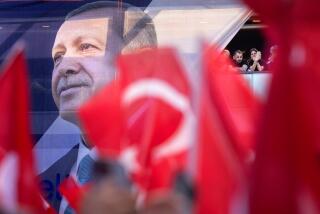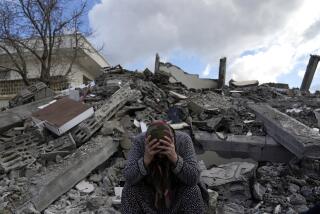A Friend in Deed Has Special Needs : Turkey’s crisis role puts pressure on Ozal government
- Share via
Architects of grand alliances, like the one now confronting Saddam Hussein, like to envision their creations as instruments of watch-like precision--each component carefully machined to mesh in whirring unison toward precisely the same goal. In fact, such aggregates of nations usually resemble a peddler’s cart--jammed with all the baggage it possibly can carry, lurching forward on the strength of a daily series of small transactions.
The anti-Saddam coalition is no exception. Its members are bound together by a dizzying array of interests and aspirations, all of which the United States, as leader of the alliance, must take into account. Special attention, for example, must be be paid to the particular contributions and needs of Turkey, which already has paid a stiff price for its firm opposition to Iraqi aggression.
Without Ankara’s participation, the economic boycott of Iraq would have no chance of success whatever; without its clear support, the chances of a successful military campaign to dislodge Saddam from occupied Kuwait would be even more problematic.
Turkey’s significance to the coalition’s military initiative is clear: With a large, well-trained Turkish army on his northern border, Saddam must maintain battle-ready troops there that otherwise could be deployed in Kuwait. Moreover, if hostilities do break out, he faces the grim possibility of waging a two-front war. Perhaps more important would be Turkey’s permission for the United States to launch anti-Iraq air strikes from the NATO air base at Incirlik, just 300 miles from the Iraq border.
Wednesday, Ankara asked NATO to send additional air units to the base, in part, to put Saddam on notice that any preemptive strike against Turkey would be taken as an assault on NATO itself. According to a senior Turkish official, the new units would join 48 U.S. combat aircraft and a squadron of U.S. F-15 fighters, which arrived unexpectedly this week.
Under the special war powers granted last September by the Turkish Parliament, President Turgut Ozal can grant approval for offensive use of the planes based at Incirlik. By some reports he already has, and domestic opposition to that and other pro-alliance decisions taken during the gulf crisis is thought to have figured in the recent resignations of key advisers.
Ozal’s civilian government already is under domestic pressure because of its failure to curb inflation and growing political violence and for its studied indifference to rising Islamic extremism. The Western World has no interest in seeing the consequences of the gulf crisis push Turkey back into another round of repressive military authoritarianism.
No nation orders its affairs purely on economic considerations, but the West can help Ankara maintain its still-fragile democratic institutions by doing what it can to ameliorate the monetary consequences of Turkey’s participation in the anti-Saddam coalition. By some estimates, the direct cost to Ankara of its participation in the United Nations embargo on Iraq--Turkey’s largest trading partner--may run as high as $9 billion.
The United States has indicated it will ask the Gulf Crisis Financial Coordination Group to come up with an additional $5 billion next year to help Turkey and the other front-line states defray such costs. Most of that money is to come from Saudi Arabia and the other gulf states that have benefited from rising oil prices.
There is, however, a limit to the amount of direct aid Turkey can absorb without exacerbating its high inflation. What Ankara needs--and deserves--is a reconsideration of its application to join the European Economic Community, wider markets for the exports that are the key to its next round of economic growth, and, perhaps, some consideration of its burdensome foreign debt, whose service currently accounts for fully 20% of the nation’s budget.
More to Read
Sign up for Essential California
The most important California stories and recommendations in your inbox every morning.
You may occasionally receive promotional content from the Los Angeles Times.













